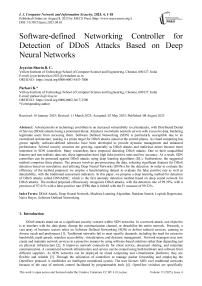Software-defined Networking Controller for Detection of DDoS Attacks Based on Deep Neural Networks
Автор: Jeyavim Sherin R.C., Parkavi K.
Журнал: International Journal of Computer Network and Information Security @ijcnis
Статья в выпуске: 4 vol.17, 2025 года.
Бесплатный доступ
Advancements in technology contribute to an increased vulnerability to cyberattacks, with Distributed Denial of Service (DDoS) attacks being a prominent threat. Attackers overwhelm network servers with excessive data, hindering legitimate users from accessing them. Software Defined Networking (SDN) is particularly susceptible due to its centralized architecture, making it a prime target for DDoS attacks aimed at the control planes. As cloud computing has grown rapidly, software-defined networks have been developed to provide dynamic management and enhanced performance. Several security concerns are growing, especially as DDoS attacks and malicious actors become more interested in SDN controllers. Many researchers have proposed detecting DDoS attacks. Due to their unqualified features and non-realistic data sets, these approaches have high false positive rates and low accuracy. As a result, SDN controllers can be protected against DDoS attacks using deep learning algorithms (DL). Furthermore, the suggested method comprises three phases: The process involves pre-processing the data, selecting significant features for DDoS detection based on correlation, and utilizing Deep Neural Networks (DNNs) for the detection. In order to evaluate the efficiency of the method proposed, we employ a benchmarking dataset to evaluate the false positive rate as well as detectability, with the traditional assessment indicators. In this paper, we propose a deep learning method for detection of DDoS attacks called DNNADSC, which is the first anomaly detection method based on deep neural network for DDoS attacks. The method proposed efficaciously recognizes DDoS attacks, with the detection rate of 99.39%, with a precision of 97.41% with a false-positive rate (FPR) that is 0.0665 with the F1 measure of 99.32%.
DDoS Attack, Deep Neural Network, Machine Learning Algorithm, Random Search, Logistic Regression, Naive Bayes, Software Defined Networking
Короткий адрес: https://sciup.org/15019881
IDR: 15019881 | DOI: 10.5815/ijcnis.2025.04.01


